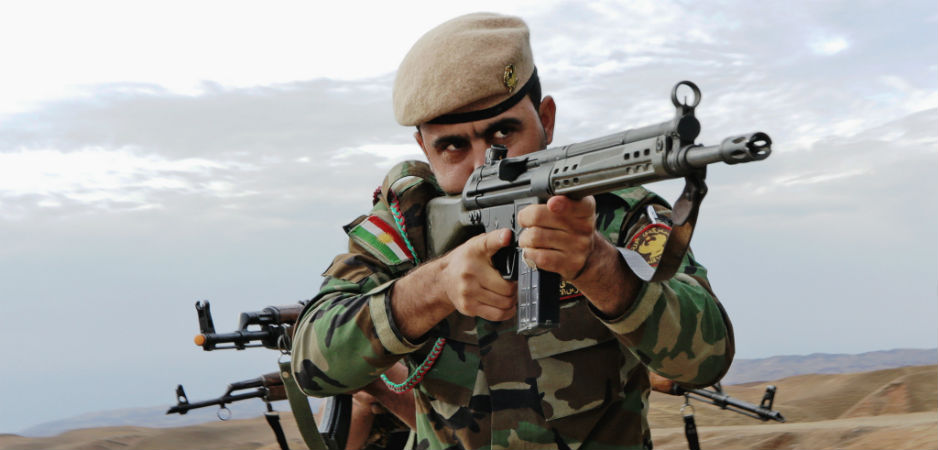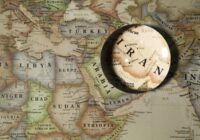Can the Islamic State be defeated from the air alone? The answer: no, it cannot.
It is impossible to understand, let alone read, the torrent of commentary, analysis and just plain venting that has followed the unspeakable tragedy in Paris on November 13. No one could be blamed for simply tuning out. How much human suffering inflicted for apparently wanton cause can one person tolerate?
But confront the tragedy of Paris—and let us not forget Ankara, Beirut, the skies over the Sinai, and Baghdad—we must.
Throughout our history, humanity has had to confront evil as perpetrated by one against another. On a grand scale over sometimes-inordinate periods of time, good—or something better than the evil it opposed—has usually prevailed.
Whether one chooses to attribute that to divine providence or mere survival, triumph of good over evil has been the case. But it is only true when the forces of good take concerted, determined action, with all the sacrifices that may entail, to confront evil. So it can be in the face of mankind’s latest challenge, the diabolically ruthless, violent and uncompromising Islamic State (IS). We can and must move forward.
Why Paris?
Before deciding the strategy for defeating IS, let us first stop and consider what Paris and the tragedies that preceded it might be telling us about humanity’s latest incarnation of evil.
What conceivable advantage might IS have gained by attacking thousands of innocents in Paris? Militarily, none really. The attack killed not a single member of France’s armed forces or destroyed any target of military consequence. It struck fear and panic, to be sure, but the French, having suffered through two World Wars whose atrocities were infinitely worse than Paris’ sad toll, are hearty souls with a fierce sense of liberty and independence. They, like their European and American allies, will not bow—ever.
In fact, the senseless act in Paris is more a declaration of purpose by IS. A fundamentally apocalyptic organization, the Islamic State is not merely content with a neat little caliphate. It wishes to fulfill its mission to lead the forces of Islam—that is the group’s Islam and not that of the 99.9% of other Muslims around the world—against the forces of the anti-Christ (the crusader West, their quisling Muslim collaborators and Islam’s apostates, like the Shia). There can be no compromise, no appeasement and no ceasefire.
So, in the Islamic State’s perverse logic, provoking its enemies in the West expedites militarization of the coming apocalyptic confrontation. Post-Paris calls for a united front to oppose IS are present proof of the organization’s claim that the forces of the anti-Christ—the West, Muslim collaborators and the apostates—will unite in the great battle against the forces of God (i.e., the Islamic State). So, the post-Paris calls really come straight from IS’ ideological handbook. Paris and tragedies to follow are intended to provoke this reaction.
To fulfill the mission of taking on such a massively manned and equipped enemy, IS will need soldiers. Lots of them. The most optimistic current estimate of the Islamic State’s strength is some 30,000 fighters. That’s hardly enough to defend its caliphate, now under even greater pressure as coalition aircraft ramp up attacks and Kurdish forces press in from the east and north.
But a world-shaking attack at the heart of the crusader kingdom offers a spectacular recruiting bonanza. With more likely to follow, IS will doubtlessly saturate social media with the inevitability of its victory over the anti-Christ and the rewards of death in the service of God’s ultimate calling.
In fact, IS cannot pursue its mission, much less take on the so-called “forces of evil,” without more fighters. It has bled dry the areas it occupies of fighting men and must resort to outside recruitment. For a so-called state, it may be the first that cannot even defend itself with the forces it has and must resort to hiring what amount to mercenaries. True, many share the IS ideology, but fervor alone doesn’t pay the bills; the $700 to $1,000 IS pays its fighters is also essential.
Signing up to fight for an ideologically far-fetched organization is a risk. So, IS must prove that it can win, that it can take on the most powerful forces of its enemies, especially those of the West, and that it can inflict real damage on its enemies. Paris and the attacks that preceded it are the proof. Paris, as the IS media machine would portray it, proves to would-be IS fighters that the Islamic State is, in the words of Osama bin Laden, the “strong horse” that Muslims will naturally support, as opposed to the weak one—the West.
Post-Paris, where are the enemies of IS?
To be sure, France and the United States are actively attacking IS forces and strongholds, all be it from the air only. The Arab countries previously participating in the US-organized anti-IS coalition haven’t flown missions against the Islamic State in months. The Saudis and Emiratis are engaged in their foolhardy war on Yemen and cannot spare the aircraft and resources. Russia has declared its opposition to the Islamic State but is directing the lion’s share of its aerial bombardments against largely US- and Saudi/Qatari-backed opposition forces directly threatening Syrian President Bashar al-Assad, not IS.
Turkey, paranoid about perceived Kurdish ambitions across the border, seems exclusively focused on the Syrian Kurds, who with their Iraqi Peshmerga counterparts appear to be the only genuinely effective counter force to IS on the ground in either Syria or Iraq. Iran, not part of the Islamic State’s Western enemies but IS’ apostates exemplar of Islam, appears determined to protect its Syrian puppet, President Assad, at all costs, financial as well as military, and is unwilling to make that kind of commitment to fighting IS, absent a direct challenge to Assad from IS.
It would seem, then, that even attacks as morally repulsive and emotionally wrenching as Paris and the downing of the Russian passenger airliner cannot overcome more deep-seated political goals.
Take Back IS Territory
Even so, the French and Americans are more than capable of carrying out doubtlessly punishing air attacks against IS. But one must ask the question, can the Islamic State be defeated from the air alone? The answer: no, it cannot. Degrade, yes. But annihilate or defeat, most definitely not.
To defeat IS and undermine its status as a caliphate, it must lose its territory. Under the established prerequisites for a caliphate, no territory means no state, no caliph and no IS. That can’t happen without victories on the battlefield, for which ground forces are necessary. In Syria currently, such forces consist of the Syrian Kurds and a small band of allied Arab tribes. In Iraq, it is the remnants of the Iraqi army routed by IS in Mosul in June 2014. They have their hands full retaking Ramadi, even with American help.
Clearly, then, additional ground forces are necessary in Syria to win battles and retake territory. From where might they come?
President Barack Obama has made clear he will not return American ground combat forces to the Middle East and most definitely not to this conflict. His Republican critics have called for a US-led ground force, comprising a modicum of American troops but mostly allied Arab forces. But would the Arabs commit their armies?
It is highly unlikely for several reasons.
First, there is no definitive American plan that convincingly leads to a defeat of IS. Why would any government commit troops to a campaign without a plan? Second, without serious American ground-troop buy in, Arab governments would balk. Third, if the Arabs are unwilling to commit even their air forces now, why would they commit their ground forces?
A coherent and credible US plan that included a US-troop commitment might change their minds, however.
There is a final, and less often mentioned, reason. There is a genuine fear on the part of some of these countries’ leaders that some of their forces might defect to IS. Clearly, the Islamic State would see the presence of Arab Muslim soldiers on the battlefront as a recruiting bonanza and an opportunity to colossally embarrass Arab governments. And it would not take many defections for IS to capitalize. Better not to risk it, the Arab governments wisely conclude.
The Missing Element
So, where does all this leave those of us revolted by the Islamic State, its repellent ideology and its unspeakable atrocities?
To repeat the assertion made at the outset, evil is only defeated when the forces of the opposing good take concerted, determined action, with all the sacrifices that may entail, to confront evil.
Until the peoples and the governments that lead them resolve to marshal all that is necessary to confront and defeat the evil of the Islamic State, its diabolical machinations will persist.
Resolve, not rhetoric, will defeat the Islamic State.
The views expressed in this article are the author’s own and do not necessarily reflect Fair Observer’s editorial policy.
Photo Credit: US Department of Defense
 We bring you perspectives from around the world. Help us to inform and educate. Your donation is tax-deductible. Join over 400 people to become a donor or you could choose to be a sponsor.
We bring you perspectives from around the world. Help us to inform and educate. Your donation is tax-deductible. Join over 400 people to become a donor or you could choose to be a sponsor.
Support Fair Observer
We rely on your support for our independence, diversity and quality.
For more than 10 years, Fair Observer has been free, fair and independent. No billionaire owns us, no advertisers control us. We are a reader-supported nonprofit. Unlike many other publications, we keep our content free for readers regardless of where they live or whether they can afford to pay. We have no paywalls and no ads.
In the post-truth era of fake news, echo chambers and filter bubbles, we publish a plurality of perspectives from around the world. Anyone can publish with us, but everyone goes through a rigorous editorial process. So, you get fact-checked, well-reasoned content instead of noise.
We publish 2,500+ voices from 90+ countries. We also conduct education and training programs
on subjects ranging from digital media and journalism to writing and critical thinking. This
doesn’t come cheap. Servers, editors, trainers and web developers cost
money.
Please consider supporting us on a regular basis as a recurring donor or a
sustaining member.
Will you support FO’s journalism?
We rely on your support for our independence, diversity and quality.







